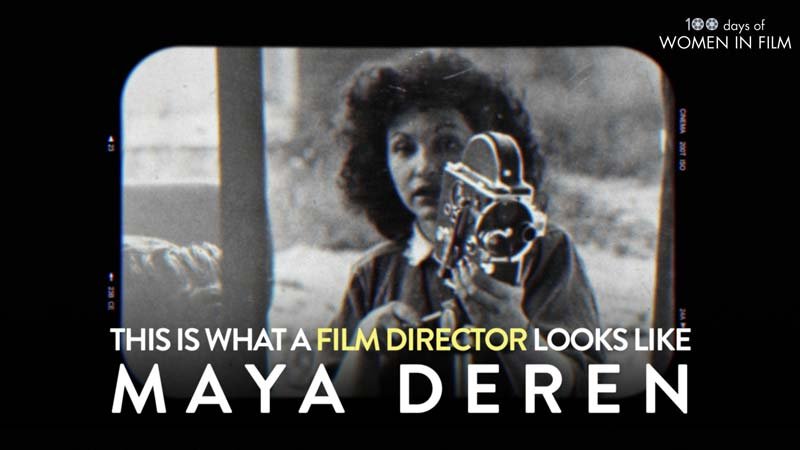Hello and welcome back to #100DaysofWomeninFilm!
I hope you had a lovely weekend.
In case you missed any of the posts from last week, I interviewed:
– film director, writer & producer Leila Djansi on Monday
– production designer Monique Dias on Tuesday
– sound designer Cindy Takehara on Wednesday
– colorist Anastasia Shepherd on Thursday
– director Jen McGowan on Friday
This week will bring a mix of profiles of pioneering women in film and professionals working in the industry in the present day.
I’d like to start the week with a quick post that puts the spotlight on who is arguably one of the most famous experimental filmmakers in the history of cinema: Maya Deren.
15/100: experimental filmmaker Maya Deren

Deren (born Eleonora Derenkowska in Kiev, Russian Republic – what is present-day Ukraine), was a true polymath who reached excellence in many art forms: from writing (an accomplished poet, film theorist and author), to dancing (she was a dancer and expert choreographer) and visual arts (photography, film directing, and editing).
Deren is best known for her 14 minute experimental film Meshes of the Afternoon (1943), which she wrote, produced, co-directed, starred in and edited. Deren’s second husband Alexander Hammid co-directed, co-starred in the film and shot it.
I remember watching Meshes of the Afternoon during my first year of film school – its mysterious, dream-like quality left a profound impression on me. It was unlike anything I had seen before.
Sight & Sound film critic Jordan Cronk discussed the importance of the film:
It all but redefined cinema’s capacity for suggestive and imagistic storytelling through its radically intuitive editing strategies and inscrutably gothic imagery.
Deren was a pioneer of experimental, avant-garde filmmaking techniques, using inventive camera angles and editing techniques like jump cuts, multiple exposures, and slow motion… to mesmerizing effects.
Her originality went beyond mere camera and editing techniques: Deren was a strong proponent of “personal filmmaking” in which “the artist crosses the threshold from that which already exists into the void where she creates… highways through the once empty spaces over the abyss.”
In the 1940s and 1950s, Deren would openly criticize the Hollywood film system, saying “I make my pictures for what Hollywood spends on lipstick.”
In 1946 Deren was awarded a “Grand Prix Internationale” for Meshes of the Afternoon at the Cannes Film Festival. The same year, the filmmaker was the recipient of a Guggenheim Fellowship for “Creative Work in the Field of Motion Pictures”.
Film historian Georges Sadoul called Deren “Perhaps the most important figure in the post-war development of the personal, independent film in the U.S.A.”
Deren’s most famous films were produced in the 1940s:
- Meshes of the Afternoon (1943)
- At Land (1944)
- A Study in Choreography for Camera (1945)
- Ritual in Transfigured Time (1946)
- Meditation on Violence (1948)
(You can easily find Deren’s films on YouTube – including Meshes of the Afternoon – but most videos have music added by fans.)
Deren passed away in 1961, at the age of 44, from a brain hemorrhage.
Links:
- Maya Deren’s Wikipedia page
- Maya Deren’s complete filmography on IMDb
- Meshes of the Afternoon review by Richard Brody in the New Yorker

Sign up to receive blog posts from 100 Days of Women in Film straight to your inbox:
Subscribe to 100 Days of Women in FilmDid you miss a post?
Visit the homepage of 100 Days of Women in Film and explore all the posts.
So far #100DaysofWomeninFilm has featured:
- 1/100: film director Elvira Notari (Italy’s first female director)
- 2/100: American cinematographer Kira Kelly (13th, Queen Sugar, Self Made)
- 3/100: film editor Margaret Booth (the first person in the history of cinema to be named “film editor”)
- 4/100: filmmaker Madeline Anderson (the first African American female documentarian)
- 5/100: film critic Iris Brey (author of the book The Female Gaze)
- 6/100: trailblazing director Ida Lupino (the first American female filmmaker to direct a film noir)
- 7/100: film director Karyn Kusama (Girlfight, The Invitation, Destroyer)
- 8/100: documentary filmmaker Veena Rao
- 9/100: cinematographer Sarah Thomas Moffat
- 10/100: film director, writer & producer Leila Djansi
- 11/100: production designer Monique Dias
- 12/100: sound designer Cindy Takehara
- 13/100: colorist Anastasia Shepherd
- 14/100: director Jen McGowan



